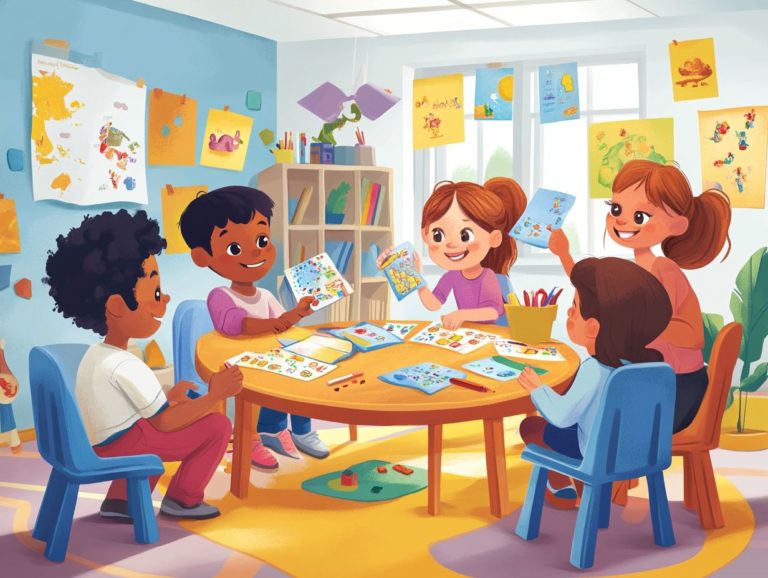7 fun ways to practice language speaking skills
Are you eager to elevate your language speaking skills? You ve arrived at the perfect spot.
Whether you re just starting out or looking to polish your fluency, mastering a new language can be both thrilling and a bit daunting. This article delves into 15 engaging methods to practice your speaking, from joining language exchange groups and attending vibrant meetups to immersing yourself in cultural activities.
With these enjoyable approaches, you ll not only enhance your skills but also savor the journey of learning. Let s jump right in and start your journey!
Contents
- Key Takeaways:
- 1. Join a Language Exchange Group
- 2. Attend Language Conversation Meetups
- 3. Find a Language Partner
- 4. Participate in Online Language Forums
- 5. Watch Movies or TV Shows in the Target Language
- 6. Listen to Music or Podcasts in the Target Language
- 7. Role-Play with a Friend or Language Tutor
- 8. Take a Language Course or Class
- 9. Use Language Learning Apps or Software
- 10. Practice with Native Speakers
- 11. Read Books or Articles in the Target Language
- 12. Engage in Cultural Activities
- 13. Take a Trip to a Country Where the Language Is Spoken
- 14. Record Yourself Speaking and Listen for Improvement
- 15. Don’t Be Afraid to Make Mistakes and Keep Practicing!
- Frequently Asked Questions
- What are some fun ways to practice language speaking skills?
- How can I make language speaking practice more fun?
- What are some tips for practicing language speaking skills effectively?
- How can I motivate myself to practice language speaking skills?
- What are some common challenges when practicing language speaking skills and how can I overcome them?
- Can I practice language speaking skills on my own?
Key Takeaways:
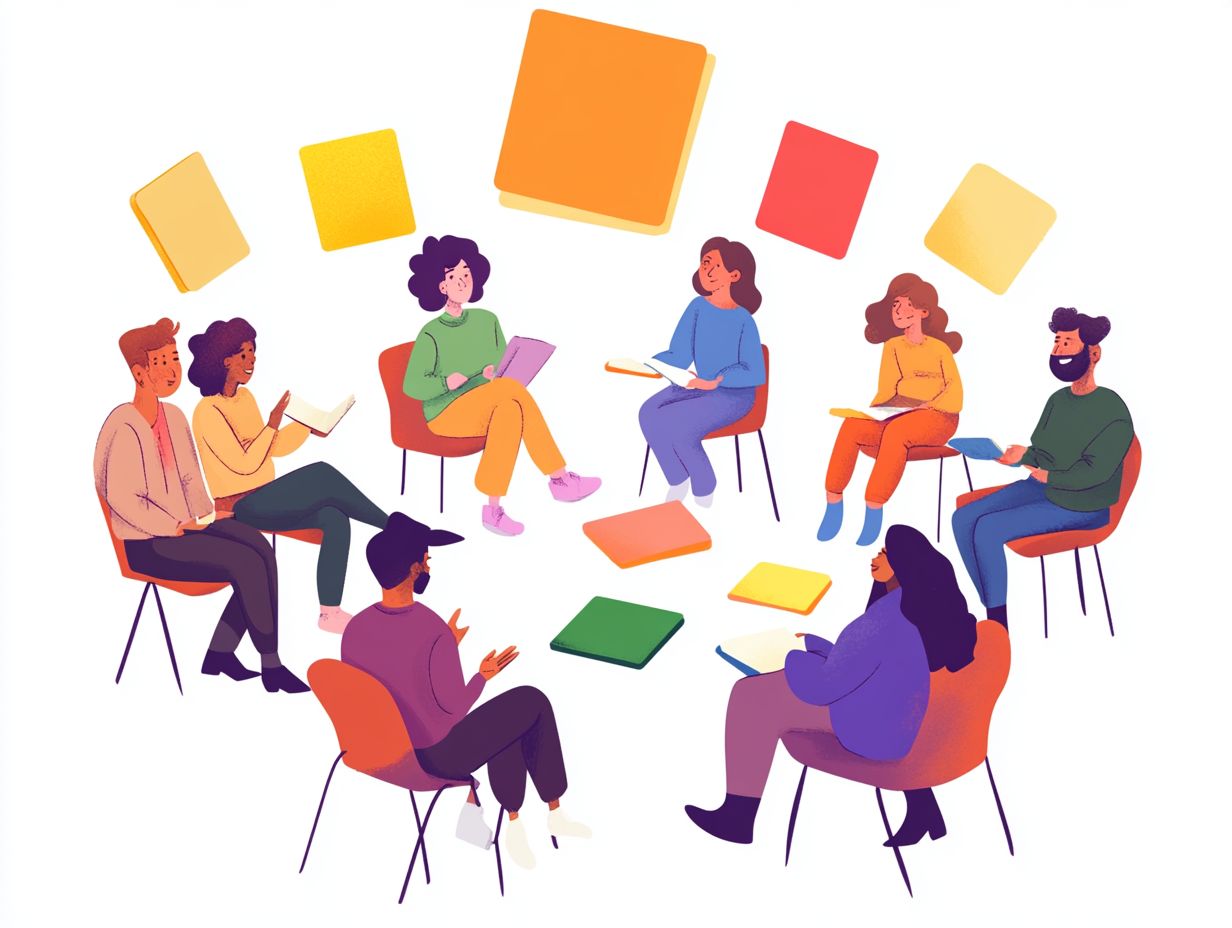
- Join a language exchange group to practice speaking with native speakers and improve fluency.
- Attend language conversation meetups for a fun and interactive way to practice speaking skills.
- Don’t be afraid to make mistakes when practicing; it’s a natural part of the learning process.
1. Join a Language Exchange Group
Joining a language exchange group is an exceptional way for you to elevate your foreign language skills while enjoying social interaction. This approach makes your language learning journey effective and genuinely enjoyable.
As you engage with fellow language enthusiasts, you can practice speaking your target language and refine your grammar. You will also receive invaluable peer feedback that can significantly accelerate your learning progress.
These groups incorporate fun activities and interactive lessons that enhance your experience. You might find yourself in role-playing scenarios that mimic real-life situations, such as ordering food at a restaurant or negotiating a business deal.
Language games can also be part of the mix, promoting vocabulary building and retention in a relaxed atmosphere that boosts your fluency. Many groups utilize online resources like language learning apps, videos, and forums to extend practice beyond meetings.
This blend of structured conversations and engaging activities sharpens your speaking skills while cultivating a sense of community and shared learning among all members.
2. Attend Language Conversation Meetups
Attending language conversation meetups offers you an exceptional opportunity to practice speaking in a structured setting. This setting allows you to refine your communication skills and bolster your confidence in using your target language.
These gatherings enable you to engage in meaningful dialogues while cultivating a sense of community among participants. By interacting with fellow learners and native speakers, you can immerse yourself in the nuances of conversational dynamics that traditional learning environments often overlook.
Many meetups integrate cultural events, such as themed nights or local festivals, enriching your understanding and immersion in the language.
This social interaction transforms learning into a delightful experience and deepens your cultural appreciation, making language acquisition a truly holistic endeavor.
3. Find a Language Partner
Finding a language partner is an excellent strategy for enhancing your speaking abilities. It allows for one-on-one interaction and personalized feedback from a native speaker or a fellow language learner.
This dynamic relationship facilitates tailored conversation practice and immerses you in a language-rich environment that can significantly boost your overall fluency.
Regular engagement with someone who shares your learning goals elevates your motivation. Both of you can encourage each other and celebrate even the smallest victories along the way.
To maintain consistency, set specific times for practice and discuss mutual interests to keep your conversations lively and stimulating.
Establishing a mutually beneficial learning relationship means being open to sharing resources and techniques, creating a supportive atmosphere where both of you can truly thrive.
4. Participate in Online Language Forums
Participating in online language forums offers you an invaluable opportunity to connect with a global community of language learners.
Share resources and discover effective learning strategies and techniques.
These platforms create a space where you can share ideas and experiences, fostering camaraderie and support among participants.
Engaging in educational activities encourages you to practice your skills through interactive discussions and collaborative projects.
Seek peer feedback on your writing or speaking exercises for significant improvements in your proficiency.
Leverage these online resources to start tailoring your study efforts today for better results!
This collaborative learning approach deepens your understanding and bolsters your confidence as you navigate the complexities of mastering a new language alongside others.
5. Watch Movies or TV Shows in the Target Language
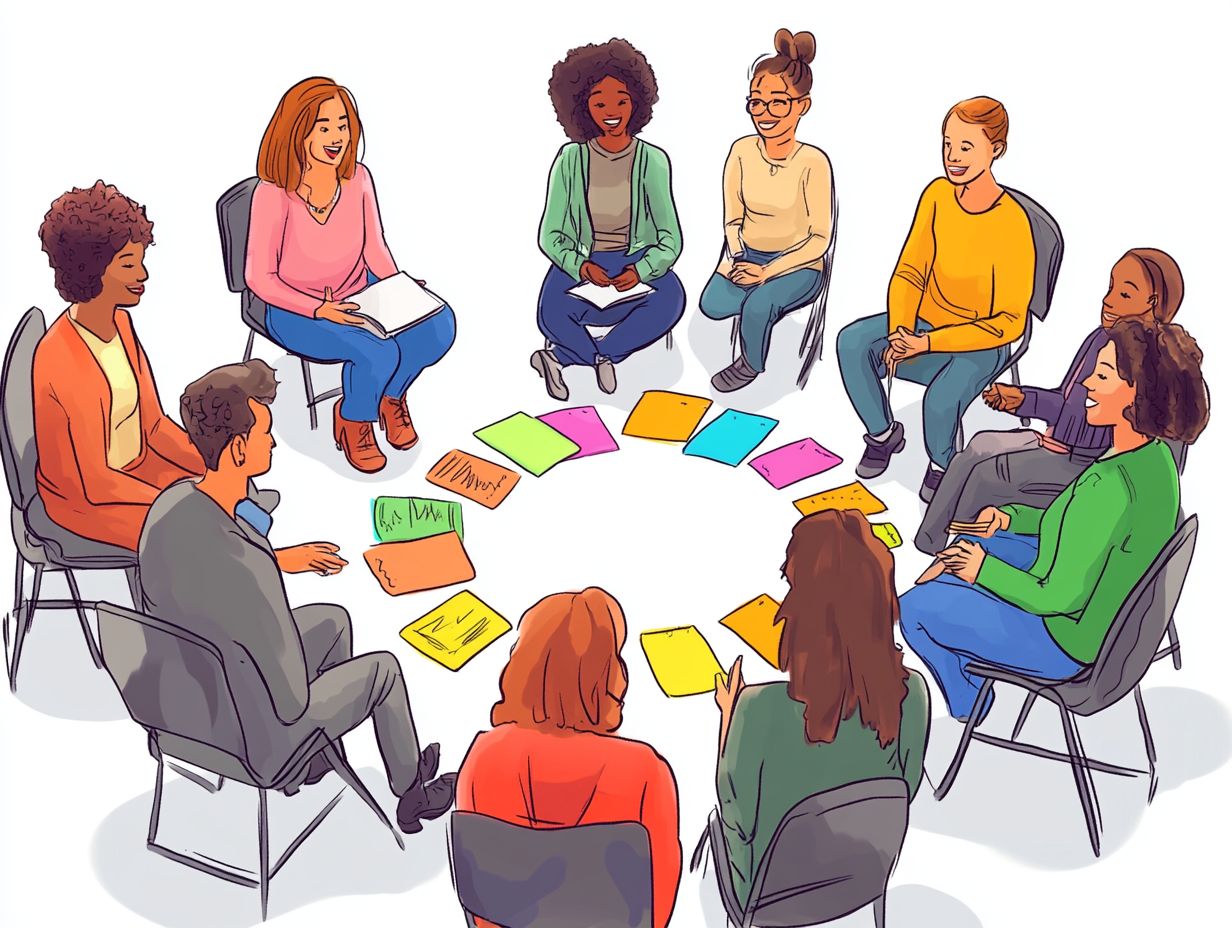
Watching movies or TV shows in your target language is a fun and exciting way to learn.
This immersive experience significantly enhances your listening skills and pronunciation while introducing you to the cultural nuances of the language.
The visual and auditory elements weave a rich tapestry for contextual learning, making it easier to grasp idiomatic expressions and slang.
As you watch, witness the emotions behind dialogues, pick up on subtle cues, and understand cultural references that deepen your comprehension.
When characters navigate various scenarios, you learn in a relatable manner; humor, drama, and social interactions make vocabulary and grammar memorable.
This delightful blend of entertainment and education solidifies your linguistic skills and deepens your appreciation for diverse cultures.
6. Listen to Music or Podcasts in the Target Language
Listening to music or podcasts in your target language isn t just a delightful pastime; it s a powerful tool for enhancing your listening skills.
Improve pronunciation and immerse yourself in the rich cultural context of the language.
For beginners, engaging with children s songs and simple podcasts makes learning enjoyable and less daunting.
These resources often feature repetitive language and clear enunciation, which are incredibly helpful for retention.
As you progress, explore popular music genres or storytelling podcasts that dive into captivating narratives to enhance comprehension and expand vocabulary.
For advanced learners, tuning into news podcasts or talk shows covering current events challenges you with complex language and diverse accents.
Select auditory resources tailored to your language level to create an immersive environment that makes acquiring a new language effective and enjoyable.
7. Role-Play with a Friend or Language Tutor
Engaging in role-playing exercises with a friend or language tutor can elevate your speaking practice.
Create a dynamic and interactive environment that fosters your communication skills and builds confidence in your target language.
Immerse yourself in scenarios like ordering food or negotiating a deal to acquire practical vocabulary and phrases relevant to everyday situations.
Exploring themes such as traveling abroad or attending social events offers rich opportunities to delve into cultural nuances.
These exercises enhance fluency, strengthen your ability to think on your feet, and navigate social interactions with greater ease.
8. Take a Language Course or Class
Enrolling in a language course offers a structured learning experience. You can explore grammar rules, expand your vocabulary, and enhance your speaking abilities under the guidance of an experienced instructor.
You ll participate in engaging classroom activities that elevate the learning process.
These activities strike a balance between speaking, listening, and writing, ensuring you develop well-rounded communication skills. You can practice conversational skills through role-playing scenarios while listening to audio materials that introduce authentic accents and cultural nuances.
Writing exercises reinforce your vocabulary and sentence structure, solidifying your understanding. The curriculum integrates various language tools and resources, such as online platforms, multimedia presentations, and interactive grammar guides, to enrich your learning experience.
These resources are invaluable aids, enabling you to refine your skills outside the classroom and ensuring steady progress on your language acquisition journey.
9. Use Language Learning Apps or Software
Using language learning apps or software can significantly enhance your study routine. These tools offer flexible, interactive strategies and a variety of tailored language drills designed to meet your goals.
These applications fit seamlessly into your daily life, allowing you to practice on the go whether during your commute or while waiting in line.
With features like a technique that helps you remember what you’ve learned over time by reviewing it at spaced intervals and gamified quizzes, learning becomes enjoyable and effective.
Set clear learning objectives within these platforms to maintain focus and motivation. Tracking your progress through analytics and visual representations allows you to celebrate small victories and adjust your study plans as needed.
This structure ensures your journey toward mastering a new language is both rewarding and effective. Start using language learning apps today to supercharge your learning!
10. Practice with Native Speakers
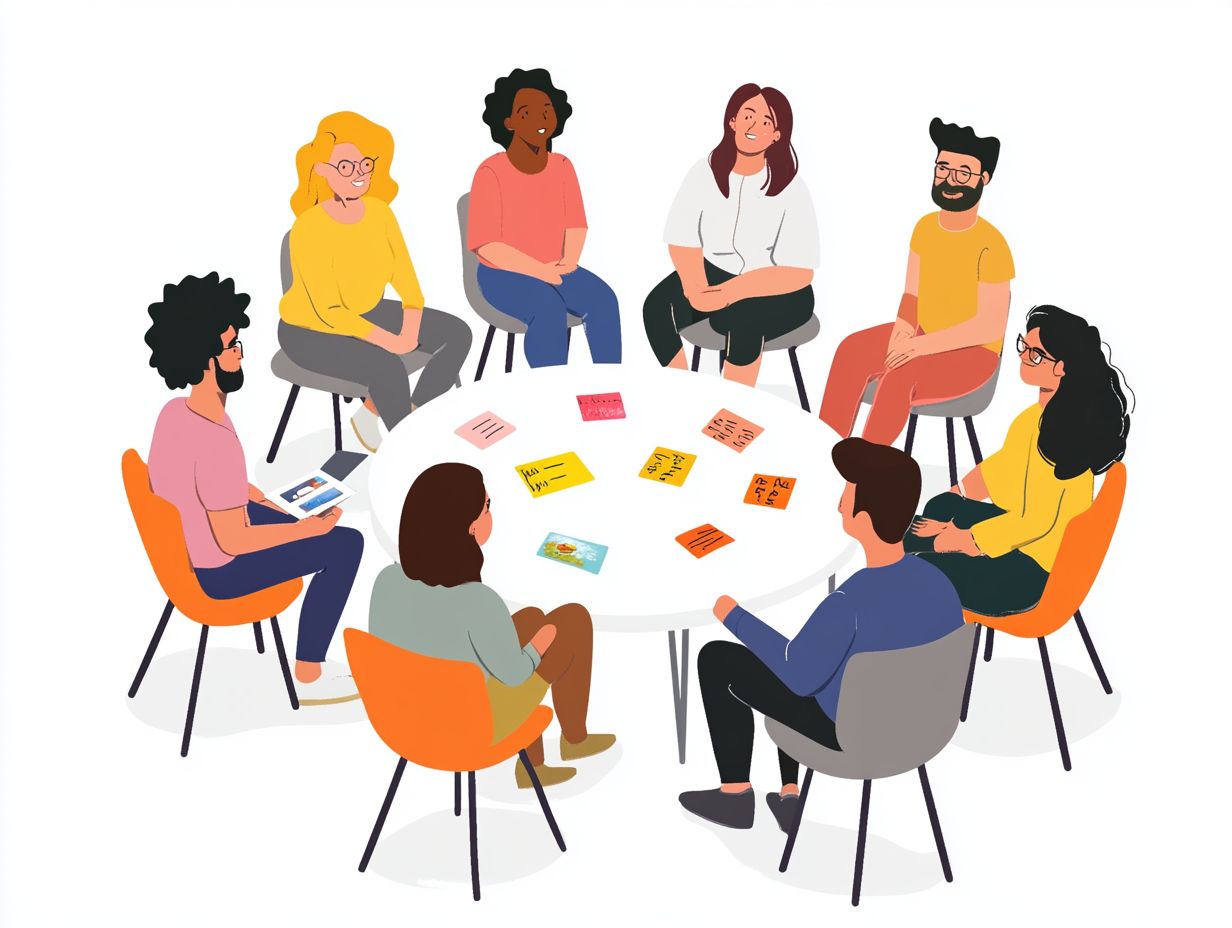
Practicing with native speakers is one of the most thrilling ways to boost your language skills! It immerses you in authentic conversations, allowing you to refine your communication abilities in real-time.
This immersive experience helps you grasp vocabulary and nuances while building your confidence in speaking.
Engaging with native speakers can occur through language exchange programs or casual conversation groups, connecting you with fluent individuals eager to share their knowledge.
Apps like Tandem and HelloTalk make these connections seamless. Local community centers often host meet-ups designed to encourage dialogue.
By consistently conversing with natives, you receive immediate feedback that sharpens your understanding and accelerates your learning process. This transforms your language journey into both an educational and enjoyable experience.
11. Read Books or Articles in the Target Language
Reading books or articles in your target language is essential for strengthening your vocabulary and cognitive skills. It enhances comprehension and overall language proficiency.
This practice can vary widely, from delightful children’s books adorned with engaging illustrations for beginners to intricate novels and specialized articles that challenge advanced learners.
Each type of reading material brings unique benefits. Short stories can boost your reading speed and deepen your understanding of narrative structures, while academic texts introduce formal language and subject-specific terminology.
As you immerse yourself in various genres, you ll become more familiar with grammatical structures and idiomatic expressions, which significantly improves your retention of the language.
This level of engagement transforms into a powerful tool, fostering vocabulary growth and a richer appreciation for the subtleties of the language.
12. Engage in Cultural Activities
Engaging in cultural activities tied to your target language enriches your learning experience. It allows you to forge deeper connections through social interactions and hands-on experiences.
Participating in cooking classes equips you with culinary skills. It also invites you to explore traditional recipes that embody the history and values of the culture.
Dance lessons provide a glimpse into the rhythms and social customs that define a community. Local festivals and events offer opportunities to interact with native speakers in authentic settings.
These immersive experiences create perfect moments for you to practice your language skills and develop cultural competence. Ultimately, they enhance both the joy and effectiveness of your learning journey.
Such activities let you appreciate the unique nuances of expression and gestures within the culture. This makes the language truly come alive in meaningful ways.
13. Take a Trip to a Country Where the Language Is Spoken
Taking a trip to a country where your target language is spoken offers an unparalleled immersion experience. It allows you to practice speaking in real-world situations and engage with the culture on a much deeper level.
By navigating daily life in a new environment, you enhance your vocabulary and comprehension. You also gain valuable insights into cultural nuances and local customs.
Attending cultural events whether they are festivals, concerts, or traditional ceremonies provides an exciting opportunity to witness the language in action. You can connect with native speakers on a personal level.
To truly maximize your language learning while abroad, set specific, achievable goals. For example, consider initiating conversations with locals or joining language exchange groups.
Keeping a journal of your daily interactions and the new words you encounter can reinforce your learning and retention. This makes the entire experience both enriching and memorable.
14. Record Yourself Speaking and Listen for Improvement
Recording yourself speaking in your target language is a remarkably effective self-study technique. It enables you to monitor your progress, refine your pronunciation, and elevate your overall communication skills.
By focusing on how your voice rises and falls (intonation) and the pattern of sounds in your speech (rhythm), you can pinpoint areas that need improvement. Active listening is essential for your growth.
Collaborating with peers who share your language-learning journey can provide invaluable insights and fresh perspectives.
Using language tools like speech recognition software or pronunciation apps offers you real-time feedback. This can be incredibly beneficial.
Set specific goals based on your recordings and invite constructive critiques from friends or language partners. This holistic approach creates a supportive learning environment, enabling you to achieve your linguistic aspirations more effectively.
15. Don’t Be Afraid to Make Mistakes and Keep Practicing!
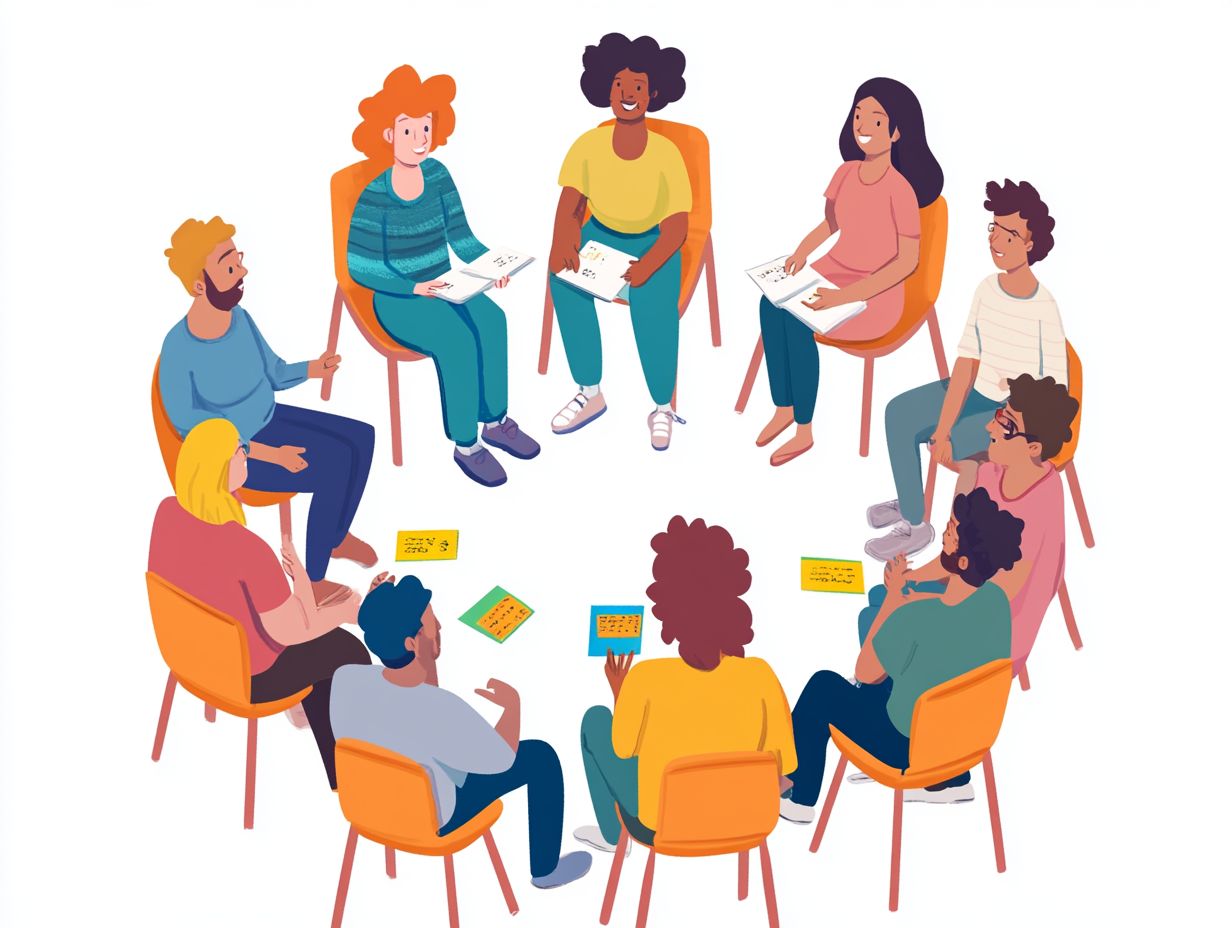
Embracing mistakes as a natural part of your language learning journey is crucial for growth. It encourages you to keep practicing and develop effective strategies that truly enhance your skills.
When you recognize that every misstep is an opportunity for improvement, you become more resilient and motivated. This shift in mindset transforms your experience into an adventure.
Think of mistakes as stepping stones! Consider setting achievable goals, celebrating small victories, and immersing yourself in engaging content like movies or games to elevate your learning experience.
By viewing errors as stepping stones rather than setbacks, you can maintain your enthusiasm. Discover creative ways to connect with the language, ultimately accelerating your proficiency while relishing every moment of the journey.
Frequently Asked Questions
Here are some common questions about language learning.
What are some fun ways to practice language speaking skills?
1. Join a language exchange group: You can find local or online groups where you can practice speaking with native speakers. This will improve your skills in a fun and engaging way, especially when you explore ways to engage with local culture for language learning.
2. Watch movies or TV shows in the target language: This is a great way to immerse yourself in the language. You ll pick up new vocabulary and expressions while enjoying some entertainment.
3. Play language learning games: There are plenty of fun games available online or as apps. These can help you practice your speaking skills in an interactive and engaging way, and you can explore 7 ways to integrate language learning into daily life for even more ideas.
4. Participate in a debate or discussion club: These clubs provide a structured platform for you to practice speaking in a specific language. Additionally, you can explore 7 ways to learn a language through cultural exchange while improving your critical thinking and argumentation skills.
5. Travel to a country where the language is spoken: Traveling gives you the opportunity to practice speaking with native speakers in real-life situations, and you can use 7 techniques for language learning through travel to enhance your experience.
6. Join a language immersion program: This is a program where you live and speak the language daily. It helps you improve your skills quickly and effectively.
How can I make language speaking practice more fun?
There are many ways to make language speaking practice more enjoyable. Incorporating 7 ways to make language learning fun such as using games, music, and role-playing in your practice sessions can enhance the experience. Set fun, achievable goals and practice with friends or in a group setting.
What are some tips for practicing language speaking skills effectively?
1. Be consistent: Set a regular schedule for practicing and stick to it.
2. Don’t be afraid to make mistakes: Remember, making mistakes is a natural part of the learning process. Speak up and practice even if you’re not perfect.
3. Record yourself: This helps you spot areas to improve and see your progress.
4. Practice with different people: Speaking with a variety of people, including native speakers and other learners, can help you improve your skills. Engaging in conversations with others allows you to adapt to different accents and speaking styles, which aligns with 7 tips for improving language pronunciation.
5. Use real-life situations: Try practicing in everyday situations, like ordering food or asking for directions. This makes your language skills more practical and applicable, especially when you apply 7 tips for effective language learning in groups.
How can I motivate myself to practice language speaking skills?
1. Set achievable goals: Setting clear, achievable goals gives you direction and motivation to keep practicing.
2. Celebrate your progress: Acknowledge your progress, no matter how small it may seem.
3. Use positive reinforcement: Reward yourself for reaching your goals or making progress in your speaking skills.
4. Find a study buddy: Practicing with a friend or study partner makes the process more enjoyable. It also keeps you accountable.
5. Remember why you’re learning: Remind yourself of the reasons you’re learning the language. Improving your speaking skills can benefit you greatly.
What are some common challenges when practicing language speaking skills and how can I overcome them?
Some common challenges include fear of making mistakes, lack of confidence, and difficulty understanding or being understood. To overcome these challenges, remind yourself that making mistakes is part of learning. Focus on your progress rather than perfection, and practice actively listening and clarifying when necessary.
Can I practice language speaking skills on my own?
Yes, there are many ways to practice on your own. Record yourself speaking and listen back for areas of improvement. Dive into practice with online language exchange partners and make new friends! You can even have conversations with yourself in the target language. For more effective techniques, consider these 7 tips for language immersion at home. However, practicing with others and getting feedback from native speakers is also beneficial.

